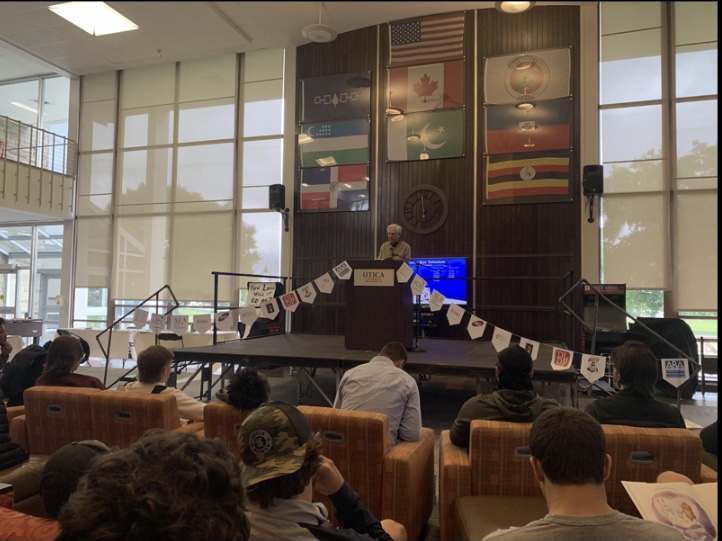- Arts & Entertainment
- Community
- Community
- Events
- Featured
- Features
- Local
- Main Menu
- Media
- News
- News
- On Campus
- Staff
- Student Life
- UC Profiles
- Web Content
Annual Banned Books Read-in on campus
October 16, 2022
On Wednesday, Sept. 28, Utica University students and faculty participated in a Banned Books Read-in located in the Strebel Lounge. At the read-in, members of the community could gather and share a variety of banned literature.
The University’s library provided a majority of the books read, although people brought in their own as well, which helped amass a wide variety of books and plays. Readers prefaced each story with background information about what they were reading, their personal feelings towards it, and why it was banned.
In recent years, the matter of banned books and censorship has been a widespread political issue. Organizations, private groups, and school boards are held responsible for continuous bans, explained in an article from Edweek.org. The motivation behind bans resides in topics such as race issues, religions, LGBTQ themes, and conservative views.
According to the article, more than 1,000 books have been banned this year alone.
Psychology-Child Life Major Marianne Tenney said that she feels the act of banning books tends to be overdone a large amount of the time.
For example, Tenney went on to explain, “Junie B. Jones.” This series, which is about a young girl experiencing adventures in kindergarten, was always a childhood favorite. However, due to recent censorship issues, it has allegedly been disapproved of due to Junie’s decisions and behaviors. Parents believe she is a poor influence on their children.
A few of the controversial works that were read included: “To Kill A Mockingbird,” “This Book is Gay” and “Where The Wild Things Are.” At the event, participants expressed confusion as to why “Where The Wild Things Are” was banned as it is a children’s book. This ban happened in 1963 shortly after the book was released due to content deemed psychologically damaging and abusive towards young children, according to an article from sport-net.org.
Junior Communications and Media major Jessilyn Perira’s attention was caught by the book “When I was Puerto Rican.”
“This is a book I would love to read,” Perira said. “I was upset that it was banned somewhere because it felt like I was reading a book about myself.”
Professor Rachel Wolfe read during the event along with her Literature of the Theatre class. Students from the class performed Act III of “The Importance of Being Earnest”, an 1800s play written by Oscar Wilde, which was banned in London after being short-lived due to Wilde’s sexuality.
After attending the read-in and learning more about banned books, Wolfe wants to encourage people to use the power of voting to prevent more books from being banned.
“Learn about your local elections and be an informed voter,” Wolfe said. “Vote for people that are not just running to ban books.”
A number of participants at the read-in were intrigued to learn more, some were even upset over their favorite books being banned for senseless reasons.
“Anytime a book is banned everyone will go out and try to read it,” Patrick Hampe, a senior and criminal justice major, said. ”By telling the public you can’t do something, they’re going to want to do it more.”


















![President Todd Pfannestiel poses with Jeremy Thurston chairperson Board of Trustees [left] and former chairperson Robert Brvenik [right] after accepting the university's institutional charter.](https://uticatangerine.com/wp-content/uploads/2023/10/unnamed.jpeg)




















































































































Janis Winn • Oct 20, 2022 at 1:57 pm
This is an outstanding article that captures perfectly the spirit and intention of our annual Banned Books Read-In. Thank you to Grace Monaco and to all who participated in the event!